Theatre Reviews
15% OF THE SEAGULL - Mayer & Martin
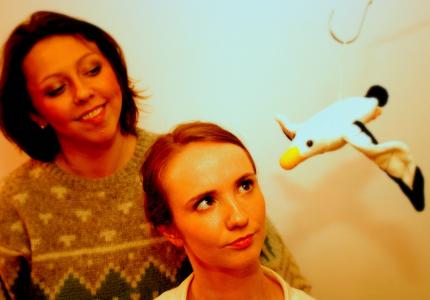
Aspiring actor/director Liberty Martin is trying to put on a production of Chekhov's 'The Seagull' in a scout hut with a disparate mix of actors. She has played Nina many times 'in auditions', but things are not going smoothly here. Brittle and uptight, Liberty is coming to terms with the loss of her entire cast bar the inexperienced Cheryl, originally cast as the maid. Though Liberty is disdainful of her, it is Cheryl that persuades her that they should give it a go with a cast of two, and when Liberty discovers that they don't need approval for the rights if they only do 15% of The Seagull they have a show.
There is much pleasing comedy, the contrasts between the intense thespian Liberty, and the seemingly slow-witted down-to-earth Cheryl gives plenty of room for comic conflict. Cheryl misunderstands Liberty's 'luvvie' speak - "we need to be coming from the same place", "where do you live, I can give you a lift" - and has some lovely one liners. But Cheryl also cuts through the nonsense of Liberty's comically overdone diagrammatic analysis of The Seagull to get to the heart of the play.
There's nothing earth-shattering here, but it's a fine piece performed very well with lots of laughs from an appreciative audience. On occasion the stage entrances and exits were a little clumsy; the first time Cheryl came on through the audience's entrance I was conscious of someone there which distracted from what Liberty was doing onstage.
In a reasonably rare occurrence, this was a show which ended sooner than I would have liked, in fact I was taken by surprise at its abrupt conclusion. It had held the attention very well and I felt there was more of the story to tell. As Liberty herself might say, I'd like to have explored more of her dramatic arc. Oh well, always leave them wanting more!
Steve Walker
4.48 PSYCHOSIS by Sarah Kane - Craft Theatre Company
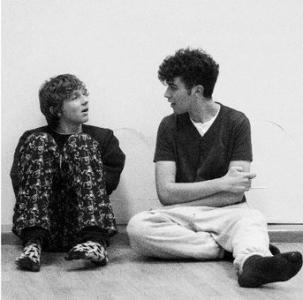
Sarah Kane's 4:48 Psychosis, written shortly before her suicide in 1999, without explicit characters or stage direction, is something of a blank slate on which a company or director can write whatever ideas the text suggests to them. Inspired by Kane's clinical depression, the play struck me as if a scream of despair had been slowed down, broken down into its constituent parts of self-loathing, the patronising attitude of clinicians, insomnia, self-harm and medication.
The youthful members of Craft Theatre have grasped the nettle of this piece with both hands. It is clearly a work that speaks to them and this leads to a committed and intense performance. There is a raw physicality to their work, characterised from the offset by 11 people on the tiny Paupers Pit stage which I found invigorating. Together they create some powerful images - writing on their arms, forcing green straws into their mouths, stripping to black leotards and t-shirts as they lose individual identity.
Kane's language can be stark and brutal, but there is much of beauty in it. It was rendered with varying degrees of clarity by this talented young cast, and maybe more work could be done on bringing the text itself to the foreground. However, what they lack in verbal technique, they more than make up for in intuition, honesty and energy and I'd hate one to be improved at the cost of the other. This youth group (under the direction of Sian Dudley and Janine Kirk) have put together an arresting and memorable piece of theatre, which for all its rough edges at moments is to be commended.
Robbie Carnegie
A MIDSUMMER NIGHT'S DREAM by William Shakespeare - Young REC Theatre Company
The REC's Marquee at Poole's Cavern is decked out in a stark white, black and mirrored set, the young cast are all dressed in white - but this production of A Midsummer Night's Dream is far from colourless.
With the text well edited by Martin Beard, this is a pacey, lucid production of Shakespeare's favourite. The downside of it being a favourite can be that familiarity breeds contempt but there is much that is new and fresh in this production. Even before the show proper starts, the audience are treated to the attentions of a cute selection of fairies, taking their tickets and questioning them on their dress sense or whether they've seen a mushroom. Then Laura Monaghan's atmospheric flute music kicks in and the show gets going.
During the first half of the show, I wondered if it was perhaps a bit static (the combination, perhaps, of a large, inexperienced cast, a smallish stage and a floor that seemed to exhibit many tripping hazards). But come Act II and it bursts into life, with the charge led by Annie Osborne's physically uninhibited firebrand, Hermia. As the main fairy characters, Oberon, Titania and Puck, Francis Bench, Zoe Salmon and James Chetwood all exhibit a commendable grasp of Shakespearean verse and their speeches are all clear and easy on the ear (with Miss Salmon also exhibiting a pleasant singing voice).
Obviously the comic heart of the play comes with the Mechanicals and their play, but like all Shakespearean comedy, it can sometimes prove a bit tiresome. Here, though, all the Mechanicals are genuinely funny - none more so than Ellie Burke as Peter Quince who never misses a trick. Tom Larken, as Bottom, has a flat, Michael Caine-like delivery which gives his lines a freshness, and his reactions at Titania's love for him are well rendered. And, while I initially had doubts about a girl playing Francis Flute (the joke is that he's a boy who has to dress as a girl), these were permanently dispelled by the hilarious Holly Chetwood, decked out in ill-fitting bridesmaid's dress, limping on one high heel and rouged up like Bette Davis in Whatever Happened To Baby Jane, over-acting her heart out.
Although I've picked out individuals here, this was unquestionably a team effort, a real ensemble piece, and everyone involved should be commended for their part in making it a charming evening. Tickets are selling fast for the remaining performances this week, but an extra matinee has been added on Saturday afternoon if audiences want to catch it.
Robbie Carnegie
ALL TOMORROW'S PARTIES by Nick Brelsford - Tilly Mint Theatre Company

Sunday 10 July, 2011 at 17:00 - 17:45
I have to admit, I love to witness a gripping conflict ignite and heat up the stage. It's intense, exciting and a clever ploy to provoke and question the notion of right and wrong. The raw animosity served up in Nick Brelsford's new play, All Tomorrow's Parties, does not disappoint as it digs deep into relationships, communication, love and infidelity.
At first glance, All Tomorrow's Parties delivers an all too familiar narrative that is no stranger to the stage: the collapse of a middle-class marriage. However, it is the manner in which this relationship is dismembered that makes it so intriguing. As the husband and wife team commence battle with blame, badgering and spiteful 'cheap shots' it becomes apparent a bigger issue is simmering under the surface.
Murray Taylor and Angela Buttrill gave convincing performances as they come to terms with a failing marriage. They spiral in and out of contempt, guilt, anger, pity and relief as they realize the missing link in their relationship is communication - perhaps a universal theme that resonates in all of us.
Intersected by a series of significant 'flashbacks' to the couple's past, the characters escape into the happier moments of their journey together. As these elements of light and shade are revealed, the characters become more genuine and relatable.
All Tomorrow's Parties examines relationships, mistakes and the reasons why we love. All Tomorrow's Parties doesn't leave you with any answers but it does leave you with something to think about.
Simone Ruggiero
BANE / BANE 2 / BANE 3 - Whitebone Productions

Monday 11th July 2011
What a difference a year makes! Last July I made up 10% of this show by myself, this year the small auditorium was nearly full with a very appreciative audience. Successful stints at this and Edinburgh's fringes appear to have whetted the appetite of this first night audience, and rightly so.
Bane is performed by Isle of Wight based Whitebone productions featuring Joe Bone as everyone and Ben Roe as a very atmospheric addition on guitar. It is the story of the eponymous private detective and his struggles with the villains of what I imagine to be NYC, chiefly the predictably foreign-sounding Mendoza and Shelby. The ambience owes a lot to those old films noirs with a first-person narrator which those of us of a certain age used to watch, but also to that old roué 007 himself.
Bone (Bane)'s versatility as a performer is astonishing. He performs the many different roles - the Film Noir detective, the unbeatable Bronson, the nervous Neil, the Latinate Mendoza, the Teutonic Vitaly and evil British Skelby with his villain's laugh with superb verve and you really feel these are different characters. The voices and accents are superb, my own favourites being the mad scientist Viktor Necropolis and arch-villain Skelby himself. The sound effects all come from Bone himself, doors creaking, an answer phone, the muffled shotguns and (too briefly) the very imaginative Stateside radio being tuned.
The direction could be described as minimalist and there are no props, but you don't need any with an actor single-handedly capable of simulating a car chase, a gunfight or an opera. The script is full of gems of laughter and parodies the clichés of the above-mentioned genres- 'I wasn't going to let him slip through my fingers this time...' And watch for the open-mike evening in the bar at the end!
This is superb entertainment and you barely notice an hour pass. My only carp is that the Fringe programme makes it unclear which Bane is on when; on Tuesday 12th Bane 2 is on at 745, Bane 3 at 1030. They are stand-alone shows in their own right and on this evidence will well be worth an hour or two of your time.
Ian Hamilton.
BEING NICE by Mark Niel - Ashrow Theatre Co.

Milton's Head, 19th July (and again on 21-23 July)
It's good to see theatre again at the Milton's Head, which makes the perfect venue for this new "domestic comedy". Mark Niel, who was an energetic and positive presence at last year's Fringe, wrote Being Nice. It receives its premiere here - and this also marks the first production by Ashrow Theatre Company.
Being Nice isn't ground-breaking or cutting-edge (the usual swearing hardly qualifies). This isn't meant as a criticism - merely to help audiences to choose what to see. What it is is a tightly constructed and well-written piece exploring the dynamics between Geoff (played by Math Sams) a middle-aged landlord and his two 20-something lodgers. Alison (Rowan Scarborough) is apparently tough - she can separate her emotional and physical lives. You can tell she's one version of what it is to be a modern sort of a woman from her laddish language. The other lodger is Emily (Prudence Edwards). 'Emms' isn't having much fun in life and finds people of her own age - especially 'boys' - rather shallow. Geoff is recovering from the trauma of a failed marriage.
The characters are types - there isn't room here to develop them in great detail - but all three actors bring energy and commitment to the roles so that we believe in Alison, Emily and Geoff. At times we care about them; at other times we don't. Mark Niel says he developed the play out of an improvisation exercise because he found the characters intriguing. I think his development and treatment is a masculine one - though all three parts offer plenty for the actors to work with. It would be equally intriguing to work through 'feminine' options with regards to these characters.
Guy Evans has directed Being Nice with pace and purpose. There are no lulls and the changes in mood are managed with confidence. This is a good old-fashioned drama (one bitch-slapping notwithstanding) played for laughs that knows what it is about.
This is a strong debut from a new company, and let's hope we see more of them in Buxton.
Keith Savage
BIG DADDY VS. GIANT HAYSTACKS - The Foundry Group (with The Ornate Johnsons)
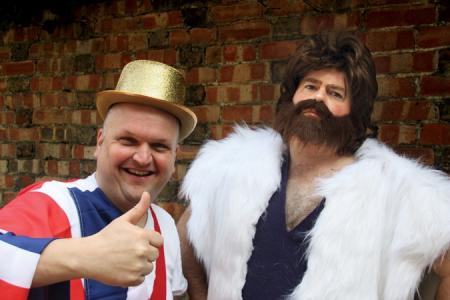
This fast-paced spectacular brings us the story of two larger-than-life characters from the glory days of British wrestling when for over a decade from the mid 1970s the nation delighted to the antics of grown men in leotards pretending to do battle in the ring. It may have been a dubious sport but as sheer entertainment it was hard to beat and this show by writers Brian Mitchell and Joseph Nixon brilliantly captures the atmosphere of those heady days - reminding those of us who used to watch on Saturdays at 4pm just why it was unmissable, and giving those too young to remember a taste of this theatricality from a simpler age.
From the off the audience is drawn into the action as the master of ceremonies gathers us together at the front to create a "true" wrestling audience - tonight there'll be "no lurking at the back".
But we start with Shirley Crabtree considering retiring from the game with his wrestling career somewhat in the doldrums. His promoter brother Max has other ideas and grand plans - he wants to make wresting "bigger than darts" but needs an image for his brother. After trying a few that don't catch fire (Battling Guardsman and the Blond Adonis) they hit on Big Daddy and develop his trademark Belly Butts and Belly Splashes to dispatch opponents.
We have our British Bulldog "blue eye" but he needs a "heel" and soon finds one in the towering shape of a 6 foot 11 inch bouncer from Salford. Giant Haystacks (for it is he) fills the role admirably and is brilliantly portrayed by David Mounfield who brings out the complexity of this deeply religious man who won't wrestle on a Sunday and pronounces in flat Mancunian tones that "I like to be alone with me thoughts".
The scene is now set for the story of the rise and fall of this dynamic duo and it is told with panache and a pleasing level of wrestling detail. There is a sureness of touch from the writing, which treads a fine line between pathos and belly laughs, and the acting from Ross Gurney-Randall and David Mounfield is consistently excellent.
The highlight for me was a complete staged bout between the two wrestlers recreating all the moves and fighters' theatricality. We needed little encouragement to cheer Big Daddy with his signature chant of "Easy, Easy" and to boo the misunderstood baddy who remonstrated with the crowd over the unfairness of his handling while tromping around in silver platform boots, flicking vs at the audience.
Perhaps the most extraordinary thing of all about this show was how it demonstrated that even today, wrestling with all its melodrama still works as pure entertainment, more theatre than sport, and all the better for it. Highly recommended.
Dan Osborne
BILLY LIAR - Looking Glass Theatre Company

"I don't want to live in a town where everyone knows me" says Liz to Billy as she plans her escape to London. The need to get out before it's too late seems to be the essence of Waterhouse and Hall's 1960 black comedy. Looking Glass Theatre Company performs this classic play with a nod to the film version and they look like they thoroughly enjoy it. For the talented cast of young actors this is the culmination of months of hard work and dedication that pays off. The set allows for the sense of time and place, with the use of simple props and costume codes. Although this is essentially Billy's story (cheekily played by Jack Ashcroft) the cast work well together to depict the small town frustrations - whether it's blonde Rita who works in the Milk Bar (a fiery performance from Francesca Hulme) who fights over Billy with mousey Barbara (nicely understated from Kate Bentley even while munching through a few oranges!) with both girls battling for the 'fizzing' engagement ring. Notable for a well-delivered and sensitive scene is Elsje Hugo (doubling up as the scatty Gran and the carefree Liz); her scene with Billy on the park bench as she decides to head to London on the midnight train captures the mood and feeling of youth's desire to move on and find a more exciting life somewhere, somewhere, as Billy says, where they drink coffee, even espresso! As this was their first night performance, the overall pace could have been quicker and one or two cues picked up, but that doesn't alter the fact that this is a fine production with comedy and tragedy underpinning a timeless story.
Starts at 7pm and finishes at 9pm (not 9.30pm as stated in programme) at Buxton Community School Drama Studio.
Jason Hudson
BLITZ BRIDE by Claire Spratt - Planet Rabbit Productions Ltd
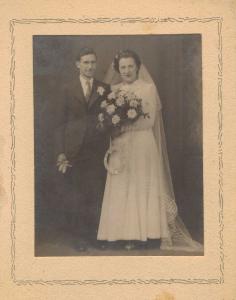
Another top notch offering from Planet Rabbit productions. Essentially this is the story of Clare Spratt's (the writer and artistic director of Planet Rabbit) grandparents, but it could be anyone's grandparents' story.
A mixture of pathos and comedy we meet Mrs Pattisson, her daughter Ruby who is doing essential work with the ATS and affianced to Henry, and Ruby's best friend, Nancy, already married and pregnant.
Hannah Levy's sterling performance portraying four different characters, two on stage at the same time is brilliant. Ruby is the hard working ATS girl, away from home 3 months at a time with 10 days leave and making plans for a 'small' wedding once the war is over. She didn't go into the munitions factory as her father says he didn't want her 'turning yellow!' Suddenly real life interrupts as the government announces that all single ATS women are to be posted abroad to assist the war effort. What can be done to stop Ruby being sent to the front? Enter Dad and Arthur with the only solution - make sure Ruby is not single!
Plans are put in place and with rations only allowing to cater for 30 people at a wedding Ruby is sure that she will get the quiet 'do' she wants.
Meanwhile we have the ever expanding waistline, and appetite of Nancy - who with startling naivety is looking forward to the arrival of her first born. The baby duly arrives with hilarious accompaniment. As always Fiona Organ is totally believable in her character, excellent! The innocence and simplicity of Nancy's life with her work at the munitions factory, calling in to see Mrs Pattisson, eating her out of house and home, making plans for her best friend's wedding, and her complete ignorance of childbirth are both touching and hilarious.
However, star billing must go to Carol Ann Dunne. Carol stepped in at the last minute and had only rehearsed with the other cast members 3 times and apart from a hiccough early on, no one would ever have known. 'Mrs Pattisson' is on stage just about the whole of the time, her comic timing and portrayal of the no nonsense but good hearted (how many guests end up being invited to Ruby's 'quiet wedding'?) war time woman is terrific. Well done!
Of course special mention should be made of Reginald Bentley-Forbes for his amazing portrayal of the depressed dog Rover! And what of Frank?
Even if the sun is cracking the flags for the rest of the run, treat yourself to this production - from the tea and scones served on your arrival to the sing song at the end, plus the authentic props and costumes - the war time era is created so effortlessly.
Another winner Claire - job well done!
Linda McAlinden
CRIMINY - Awkward Cough Theatre Company
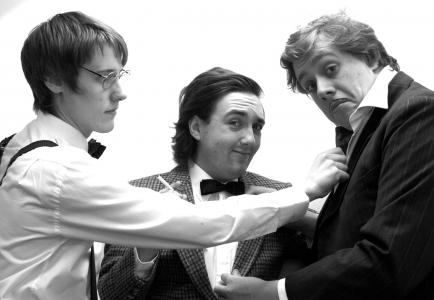
Imagine Reservoir Dogs directed by Mack Sennett, with Roscoe Arbuckle, Harold Lloyd and Charlie Chaplin as the hapless criminals, and you've got some idea what Criminy is - a heist movie re-imagined as a silent comedy.
It's a really original idea - and one which, in itself, should be applauded. Three agreeable buffoons indulging in well choreographed slapstick is always fun to watch, and some of the set pieces (abseiling down the side of the building, trying to open the door to the vault and, in particular - in a nod to the Catherine Zeta-Jones caper movie Entrapment - a hilarious take on getting through a laser screen) are particularly well realised.
Playing the three hapless would-be bank robbers, Thomas Booth (bespectacled, intense), Ian Farnell (beardy) and Samuel Oliver (big, gormless) are all engaging personalities. I think the show would have benefited, however, from their characters being more archetypal, more defined. The show is silent, after all - the audience needs to be able to identify their characters from the off. While Oliver's role is the more obvious at the bottom of their hierarchy, I would suggest there needs to be clear leader, and I think that should fall to Farnell as the brains (such as it is) of the outfit, with perhaps Booth heightening what's already there to become more of a trigger-happy psycho.
There were a few technical issues on the first night - the music kept varying erratically in volume with the sound effects coming on really quietly. Actually, maybe the sound effects aren't needed - you wouldn't get gunshots in a silent film, after all - and maybe the effect of the show would be better maintained if the actors created everything that happens visually. Also I would suggest that the music should rise to more of an obvious climax at the end, just to tip the audience off that it's finishing, rather than being an end of a scene.
As I often find with silent comedy, I was generally more admiring of the technique than falling about with laughter, but I had a smile on my face throughout the show and often had a chuckle at its originality and invention. At the end of the day, this show is a true one-off - something that's always welcome in a busy Fringe programme.
Robbie Carnegie
DEV'S ARMY by Stuart D Lee - Elysion Productions
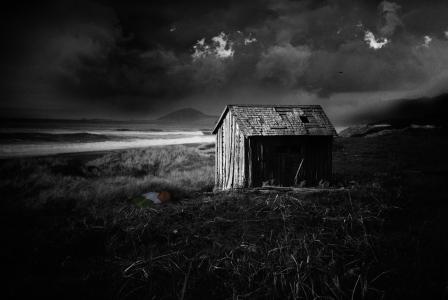
Comic, unsettling and visceral all at once, Dev's Army tells the tale of three Irish home guardsmen struggling through boredom and infighting in the Second World War. Things take a turn for the dramatic midway through the play with a blast and the arrival of a mysteriously washed up gentleman that cause old bitterness to raise its head, and camaraderie to unravel.
Stuart D Lee's writing is fluid and exciting, mixing wit and tragedy to create a moving play, facilitating a dynamic chemistry between the cast members, particularly Paddy and Michael.
The cast give a strong performance with Dean O'Sullivan (Michael) shining through his depiction of just the right level of endearing buffoonery, making the climax of the play all the more shocking. Wayne Allsop gives an enigmatic and intelligent performance as the mysterious stranger, leaving the audience uncertain throughout the play. Richard Sails (Paddy) creates a lovable and seemingly wise character, contrasting the voice of the dreaming revolutionary with Michael's 'fool' and Dermot's experience. Matt Lanigan gives a nuanced and rounded performance as Dermot and provides the perfect antagonist for Sails' Paddy.
If the play has one failing it is the small, and very occasional slip in the Irish accents, which may, for some, detract from the subject matter, however, it is neither a common nor an intrusive issue and does not interfere with the works overall brilliance. A terrific script, a strong cast, well presented and with a great twist at the end, Dev's Army is certainly worth seeing.
Charlie Newport
DOUBLE BOOKED - Ginny Davis Productions
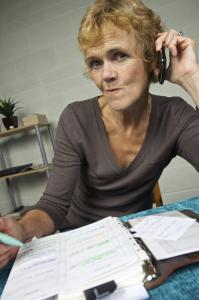
If you can imagine sitting surrounded by the constant inhalation of breath from stifled laughter; imagine watching your relationship with your family acted out before you; imagine viewing a plethora of problems be stacked up against a loveable character then you will most probably be imagining 'Double Booked'.
This performance, acted out single handedly by the phenomenal actress Ginny Davis, depicts how one person's week can become a complete chaos due to a few lies and a normal person trying to keep face. It's hard for me to not consider each character as a single actor, as each member of the completely dysfunctional (and strangely relatable) cast is embodied so brilliantly that you almost forget that the actress before you isn't a teenage boy howling in laughter about taking his clothes off and simulating sex with his friends in a chemistry lab.
Every topic a person worries about in life is condensed into this quirky hour long spectacle. Whether it be wondering if your child is gay, worrying about a lonely senior mother, or trying to not give into peer pressure by buying things you really cannot afford.
A beautiful play acted in a beautiful manner, from a superb actress who is a true master of her craft.
Curtis Golden and Kim Thomas
EXCUSE ME, I'M TRYING TO PLEASE YOU - Fiona and Friends
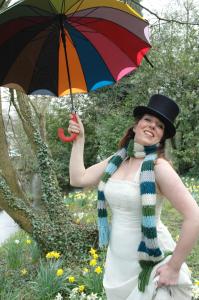
United Reform Church - Green Room
Tonight was a sell out!
The dancing girls were asked to relinquish their seats and so stood at the side of the room to wait for their call for the finale.
Packed in like proverbial sardines, we were already intimate before Fiona took to the stage. We were introduced to Joe, the pianist, who also acted as stage hand.
The show as great fun. Fiona explained that although some of the content is 14+, her attempts to 'Please You' would not involve her taking any clothes off but rather pleaded with the audience to agree a level of pleasure which would involve everyone.
And so this one woman show began, she introduced herself, though gymnastics, ballet and freshly laundered bed linen and then explained, as she disappeared behind the screens, that when she re-appeared she would not be herself but would be acting.
And so we were introduced to the characters of this cabaret (interrupted with voice mails from Rosemary):
A primary school drama teacher who believes she is Laurence Olivier,
The Port Talbot, WI chair who "looks at cakes from both sides now";
The Scouse, Mother-in-law, in the morning, at the breakfast table -
A young CHAV who likes stroking her pony (her name is chestnut)
and the "Life, jolly well get on with it" guru.
The show is a mix of fun, based on embarrassing caricatures and lost love and culminates in a party were everyone, hair full of confetti, fonnd themselves dancing home.
Why do women seem to enjoy this stuff so much more than men?
Martin Wood
FRAGMENTS - Stephen Wymark
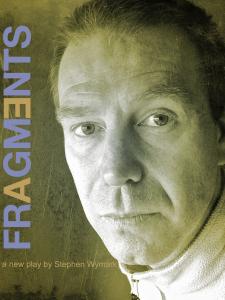
I have never before had a theatre experience quite like this one. Drama is often described as intimate and that usually implies a physical proximity with the actor. Stephen Wymark's play Fragments achieves that physical closeness, but more remarkable is the intense emotional intimacy established with each individual audience member.
Stephen wrote Fragments following a period of mental illness suffered after the death of both his parents. It is about the experience of Harry Rouen, but what exactly Harry is experiencing is not specified. Harry doesn't really know what's going on. He is struggling to pull together the pieces of a disintegrating personality, to establish what is real and what is illusion, to find out if anyone is there with him and, if they are, whether he can connect with them: 'Can I reach out to you? If I talk will you listen?' He wants to dance and run with them, to shake up his empty soul, to bottle up the fleeting feelings of happiness to save for unbearable moments.
Harry appeals to every audience member, and at one level we confront the feelings aroused when we try to relate to someone who is mentally ill: the confusion, the fear, the sense of inadequacy. At another level, we wonder whether we are really there. Are we strangers in a bar? Are we psychiatrists observing a patient? Are we figments of Harry's imagination? Should we respond? It is difficult not to.
Fragments challenges our perceptions of theatre, especially of the boundary between actor and audience. It makes us see that the audience has an important role to play. We become as interested in the reactions of other audience members as we are in the actor's performance. Harry tells us 'It's not real. It's just a play.' But maybe life is a play, maybe we are all threatened with madness as we struggle to learn our roles and connect with the other players.
Audience numbers are specifically restricted for Fragments. Book now so that you don't miss the chance to see it.
Barbara Wilson
FUGEE by Abi Morgan - Shadow Syndicate

Fugee's inception came about as a response to the global issue of abandoned children who fall outside of the refugee system in the UK; this play was commissioned as part of the National Theatre Connections programme and Abi Morgan's language is perceptive, economical and lively. This young cast of ten are ably directed through the episodic piece, interspersed with a neat soundtrack that supports the narrative. This is Kojo's story, and as he states - "I'm not just another kid in a hoodie"- the talented cast retell his story in a non-linear Brechtian fashion with flash-forwards, montages and physicality. They make inventive use of simple props (milk crates) and a tight performance space.
The central idea of the play works well; with the cast repeatedly telling the audience that they are actors representing the characters, but at times this 'distancing effect' could hinder the opportunity to fully engage with the emotional situations; however the cast mostly engage and invest the scenes with sensitivity. This is a minor element, as the piece is written with energy and conviction and stands as a testament to the control of the cast. Although this play does require a strong ensemble cast, there are some subtle performances, notably from Chris William's (confident and assured) as the central Kojo, and a nicely balanced portrayal of Ara by Laura Stafford who befriends Kojo when he's abandoned in London, and worth a mention for his clarity of language and diction is Aaron Price as Hassan, one of the other teenagers in the half-way house awaiting his fate.
The play has a political edge and this production taps right into the heart of the issue of the neglected fugees who arrive in the UK every month only to be left stranded in limbo with no clear agenda or rights; these young people often drift into the cities to be preyed on or drawn into the criminal worlds, forced to exist as teenagers in an adult environment. Shadow Syndicate work hard to capture the spirit of Abi Morgan's play for our times. Catch while you can at the Paupers Pit.
Jason Hudson
GOLD FLOWER'S STORY - Arden Theatre
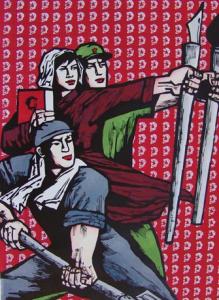
By the railway line, Pavilion Gardens, 23rd July
This show was to have been at the Burbage Institute but a double booking resulted in a late, late transfer to the green spaces of the Pavilion Gardens. (Thanks to the PG staff for their support and cooperation). Sitting outside for nearly two hours resulted in this reviewer getting both chilled bones and a sunburnt head. But enough of the complaints.
It may well have been a blessing in disguise for the seven young women - all HNC students - that make up this company to work outdoors. They had the train, impromptu football matches and a helicopter to cope with but their focus on the storytelling was impressive.
Dressed all in black and with a couple a poles and lengths of black, red and white cloth for props they used a mixture of mime and dance techniques to enhance this sustained piece of physical theatre. Director Mairi Macfarlane says:
Throughout the process I have tried to keep the piece true to the story of Gold Flower, by using the strength of the imagination as the focus of the story. This has meant keeping the set, costume and technical aspects down to a minimum. Being a lover of elaborate costume and set design, this has definitely been a challenge for me. But in keeping it to it's bare minimum, I have really been able to work in great depth with the actors' on their characterisation in each of their roles as well as their story telling skills.The story is simple enough; Gold Flower was a young woman born into a Chinese family just before the Maoist revolution. She falls in love, but her own family force an arranged marriage into another family that treats her brutally. Following the revolution Gold Flower and a sisterhood find a way transforming both her life and the lives of many women.
As someone with an informal education in Marxism and revolutionary politics (during the 1970s!) I found the confidence placed in the revolutionary cadres touching (if maybe misplaced). Certainly I hadn't expected to hear revolutionary slogans proclaimed in the Pavilion Gardens anytime soon. The Arden School of Theatre will be welcome if they return to Buxton.
Keith Savage
HOW TO CLIMB MOUNT EVEREST by Sam Gibbs - Autojeu Theatre
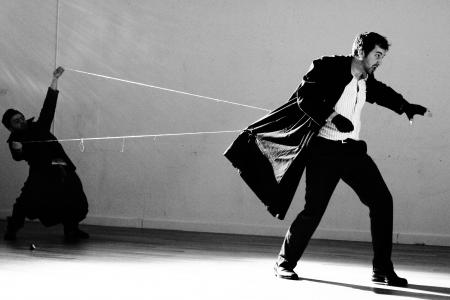
This play blends wonderful escapism with lovingly crafted absurdity to form a thoroughly entertaining piece of work played by two charismatic performers. Framed by the interjections of two French narrators, How to Climb Mount Everest, tells the tale of one man's (Gibbs) escape from the rain soaked, run over and photocopier ridden drudgery of urban life. To aid him in his mission, he is joined by Aldo, (Ozguc) an adventurer extraordinaire with a dark secret and an almost superhuman drive. Together they attempt to conquer Everest's peak.
Nusret Ozguc's sheer energy drives the performance with Sam Gibbs' expressive face adding nuance and colour. Both players perform skilfully and create a rhythmic medley of physical and vocal hilarity.
The performance is aided by the innovative use of space, through which up, down, big and small become mere bywords within Gibbs' bizarre world. The pair add another dimension to this strange realm through the use of props, reshaping birth, mountains, wind and even an alarm clock. Reality as we know it is dispensed with in the name of playful fun. For some, it may appear a little chaotic, but it is this chaos that makes the play such a good watch.
Charlie Newport
HUNGRY GENERATIONS by RE Crawley - Buxton Drama League
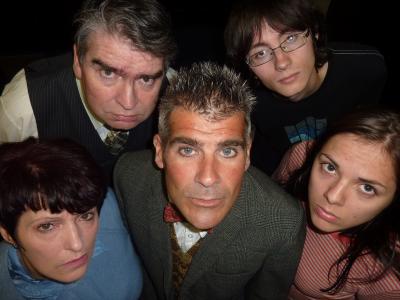
The Buxton Methodist Church helped set the suburban scene for Buxton Drama League's latest production Hungry Generations, ambitiously written by R E Crawley - winner of the Buxton writing competition Act One 2011. I felt thoroughly at home as I sat down to a scene of after dinner chat, played before me by the Masterson Household.
The play's tag line they are coming, sums up the principle for Crawley's 'them and us' story about what happens when 'the others' come to town. The opening begins with Henry Masterson played by Chris Lowdon, violently describing the procedures in the event of an intruder's arrival. Shortly after dinner the Masterson family are confronted by a well-dressed stranger and are outraged as their stylish guest claims joint ownership of their 'well bought' home.
What starts off as your everyday family conflict soon becomes a wider debate about ethics, power and responsibility and in light of the current famine in Somalia the play carries a powerful message about the value of life. I interpreted Crawley's guest as a metaphor for those living in the third world. 'Dev' the bizarrely named stranger decides that after a life of disease, famine, drought and war he, and many others just like him, will uproot and share the plentiful supplies of the developed world.
Crawley's text though truthful in places did jump from issue to issue. I felt that although the many tangents were interesting, the once fascinating premise about 'the others' became lost in domesticity and was subsequently overpowered. Sometimes I felt that the inconsequential matters belittled the play's message and stranger still more pressing issues were ignored completely. For instance both parents seemed only mildly concerned when their teenaged daughter was taken hostage by a strange man. This made the drama of the story difficult to follow and I felt that the conflicting targets left me confused. Since none of the characters invested in any one issue over another, when it came to the crunch neither did I.
However the most enjoyable moment all evening was a 10-minute delight two thirds in when the mother, beautifully portrayed by Lynda Ward performed a heart-felt monologue displaying the tragedy, loneliness and resilience of the modern mother. Jean Masterson's soliloquy was a mixture of fine writing and sincere acting. Despite being almost nothing to do with the rest of the play it was a welcome distraction.
In fact both the women in this cast should be commended; Toni Saxton did a comic and thoughtful portrayal of the daughter, Victoria Masterson. Her interpretation of a complexly written teenager, who magically transforms into a grown opinionated women as quickly as a change of clothes was mature and she held much of the production together.
All in all, an enjoyable show with some dramatic twists and turns.
Sian Dudley
HYDE by Polis Loizou - Thunder Road Theatre
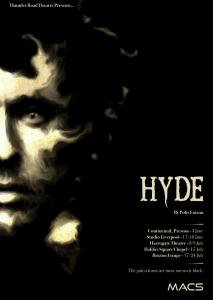
Pauper's Pit, 17th July (further performances 20-23 July)
As Polis Loizou writes in his programme notes for the new show "Thanks to a myriad adaptations and references in the media, this is one of those stories people know well, even if they haven't read it." Yes, references to someone being a "Jekyll and Hyde character" are indeed a commonplace.
This is a mixed blessing for someone using the source story. It means it is unnecessary to provide some of the back-story - the audience will fill in from their folk versions. On the other hand people may have expectations - dare you disappoint?
You'll work out your own answers when you've seen Hyde - but see it you must. It has all the ingredients of classic Fringe theatre. The bare and dark set in the intimate Pauper's Pit; two actors playing nine parts switching rapidly and convincingly; a recent award-winner returning (Alex Moran here as Jekyll, Hyde and others).
If anything Christopher Ward is even more compelling than Alex. His size allows him to dominate to the space but his central role as the lawyer Utterson places him at the heart of the narrative.
No attempt is made is this adaptation to represent the transformation between Dr Jekyll and Mr Hyde. As Polis Loizou also notes his concern is less to do with the story as a morality tale - Good v Evil - and more to do with "the duality of man". To this end the personalities and actions of Jekyll and Hyde are more significant than their physical manifestations.
This is one of the first productions of Thunder Road Theatre a new company for the north west. Hyde crackles and excites and bodes well for all involved.
Keith Savage
I TAKE YOUR HAND IN MINE - Library Theatre Touring Company

This is essentially a reading. The short and ultimately tragic love story of Anton Chekhov and his wife Olga Knipper is told through their love letters as edited by Carol Rocomora. Roger Cook is Anton and Debbie Kelly is Olga.
The strength of this piece is born of the strength of the writing and the drama of a true and mostly thwarted love. For much of their relationship Chekhov languishes under the thrall of his mother and sister Masha in his house down south in the warmth of Yalta. Meanwhile Olga has a high old time back in Moscow starring in his plays for the Moscow Arts Theatre under Stanislavski. Little love is lost between Masha and Olga and it is odd that the part in Three Sisters that he wrote for Olga is "Masha". Mind you, you can see Masha's point as Olga devotes herself to her acting career (at Anton's insistence, it must be said) and runs up massive debts back in the metropolis while he coughs blood in Yalta and various European resorts.
Anton's consumptive progress is inevitable and for the world to lose such a wonderful playwright at the age of 44 is a true tragedy. Someone should write a play about it. But then, so much of the relationship is pursued in separation through letters that it hard to see how else to do it rather than through the medium used here.
The story of Olga and Anton should be more widely known and this is a very good way of accessing it. Recommended if you want a break from high drama.
John Wilson
JACK: A RIPPER'S TALE - Different Device Theatre
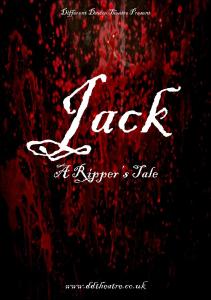
Underground Venues, 13th July 2011
The tale of Jack the Ripper is oft-told but this version takes us down into the depths of Victorian Whitechapel and tells the story from the point of view of the whores, duffers and doss-house owners.
It's not a romanticised view and neither is it for the faint-hearted; the women's discussions of their sexual practices (and accompanying prices) and the gruesome descriptions of the murders are unsparing in their detail. There is the everyday nature of their trade as they try to raise their 'doss-money' to pay for somewhere safe to sleep. But the warmth of a community of women in tough circumstances is also shown in this chronological narrative that goes through the murders as they get more brutal, the fear grows, and the rumours get wilder.
The play is well produced and competently acted by the cast of four, with good use made of the stage set of three arches that are moved around to give a convincing impression of the warren of dark alleys where the Ripper preys. The use of an anonymous Ripper, his face always masked, increases the sense of fear and there is real tension not lessened by the fact we know what will happen.
The elaborate scene changes add a sense of drama to the proceedings, but there are so many of them and as they are slow they become counter-productive and led to some shuffling in seats. The show could also do with a little tightening up, at a point when the narrative is speeding up, with two murders within an hour, the show conversely seems to lose pace with a couple of extraneous scenes.
Jack the Ripper is a subject that has been covered many times, but as the Yorkshire Ripper and the Ipswich murders have shown it has continuing relevance particularly as told in this production by those most vulnerable.
Stephen Walker
JOE - Genieoutthe bottle
HOW THE OTHER HALF LIVED
So what became of Shirley Valentine?
There's no clues here in Jeannie Jordan's two hander follow up to Willy Russell's 1986 original which is more a sideways snapshot than sequel as we meet Joe (Shirley's husband) on the night when he learns that her once in a lifetime Greek holiday has turned into permanent residency abroad - he's abandoned n she's AWOL, aka missing in romantic action.
The script strives for period authenticity yet the nostalgic references - think Babycham n Brandy n Chinky takeaways serve more as stereotypical punch bags for Joe to vent his non new age spleen upon. Alf Garnett may've been equally stuck in his non feminist traditionalist ways, yet convinced as a well intentioned yet flawed individual whose prejudices were founded upon an inherent belief whereas Joe projects as predictably semi ignorant - who wouldn't leave him?
The fine dividing line may simply be down to charm, or the lack thereof in the case of Mr Valentine - either way he's a grump who requires nil tears to be shed as he opens his heart to long time acquaintance and local barmaid Bernie as he drowns his sorrows.
The over emphasised mannerisms of the two performers becomes predictable along with their reactions resulting in a deficit of humanity; the sentiment of the conversations is credible, the exchanges less so despite the requisite dialogue.
It's a short piece (25m) yet any sweetness is dependent upon viewings of either the original stage or cinematic versions - therein lie potential references points to connect with and rekindle fond memories which momentarily flare up.
Stoon
MACBETH UNDERGROUND IN POOLE'S CAVERN - Butterfly
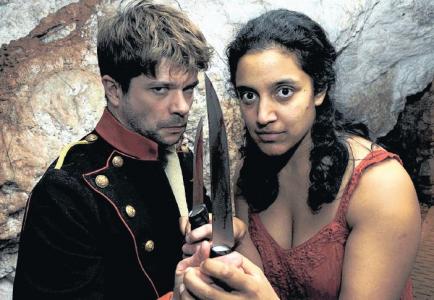
Poole's Cavern, 11-15 July 6-7pm, 7.15pm to 8.15pm, 8.30pm to 9.30pm
Poole's Cavern must have seen a fair bit of action in its two million year history but perhaps nothing as eerie and atmospheric as Shakespeare's Macbeth in this performance by Butterfly Theatre.
Drastically cut to an hour, the play still features all my favourite speeches and the small cast means that the witches double up as porter, murderers, guests at the banquet and more - an economy that actually adds meaning, giving the impression that the whole sorry tragedy is being orchestrated by these sinister hags. Full of evil menace and twisted sexuality, the witches drive both the action and the audience, urgently moving us through the cave and providing a constantly sighing soundtrack. Trust me, deep breathing works very well in a cave and when they came up behind us and traced the odd finger over our hair, we were enjoyably spooked.
Central as the witches are, it is Macbeth (Nick Danan) who steals the show. Scottish play it may be but he has an intense Northern Irish accent that works oddly well for this driven anti-hero. Shakespeare comes alive when he speaks it and he finds emotion in unusual places, his eyes filling up as he explains how he has killed the king but failed to prevent the witches' prophecy that Banquo's heirs will gain the throne. We see at once how 'of course' Banquo and his son must be killed and how more and more blood must be spilt as Macbeth's insecurity grows.
A physical and passionate actor, Danan seems to talk directly to individuals in the audience, at one point explaining his intention to kill his rival MacDuff's children while chucking the chin of a young girl fixed in his gaze. His passionate love for Lady Macbeth is apparent in their anxious embraces and their relationship is always convincing with an impressive Aileen Gonsalves (also the director) playing her as the practical one who has no time for his mental agonies - that is until she too becomes overwhelmed by the magnitude of her own sin.
The cast members make good use of the cave, scrambling around on rocks so that they are either above us or below us, but always very visible, and our progression down and down into the cave serves as an effective metaphor for Macbeth's descent into moral darkness. They also make good use of the audience - we become uneasy guests at the feast where Macbeth is haunted by the death of his victim Banquo, and, without giving too much away, we play a crucial role in Macbeth's eventual demise.
The cave's new lighting is useful but not obtrusive with one early scene conducted under a red light that appears to make blood drip from the cavern roof! At other points, the witches direct torches at the protagonists' suffering faces.
There are many effective scenes here - particularly the 'unsexing' of Lady Macbeth during which the witches circle her, tightening her corset, but also the ending including a very wince-making fight scene. Some 'holy' singing, amplified by the cave's acoustics, also proves chilling, providing a contrast to the evil at the heart of the play. Macbeth may be familiar to many of us and likewise the cave, but the combination of the two is hugely effective - see for yourself if you can still get hold of a ticket.
Stephanie Billen
MASKERADE - Imagine
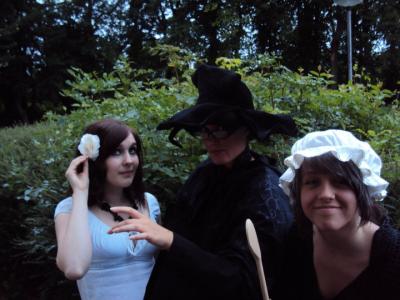
Remaining Shows: Saturday 16th of July 2pm and 7pm
Whilst the performance of Maskerade is described as amateur, the talent of certain actors - namely Rob Hamilton and Marcus Crabbe - makes the audience forget such a description early on in the play.
The adaption from the Discworld novel to the play itself has not left any of the humour behind. The plot itself follows a white masked "ghost" who haunts the opera of Ankh-Morpork leaving several corpses and mysterious notes in his wake.
The talent of new arrival to the opera, Agnes - or Purdita as she renames herself - is overlooked by her less than enchanting appearance, whilst the opposite can be said of her newly acquired friend in the opera, Christine (whom the ghost insists must play the main role each night). However, when old friends of Agnes' come into town after tracking down a conning publisher they decide to find out who the phantom of Ankh-Morpork Opera house is once and for all...
A fun piece to watch, with a lot of laughs delivered. Whilst the timing and movement of staging can be a little distracting in some places, the comedy produced is very good. Characters such as Mr Pounder portrayed by Jack Ashcroft and Nanny Ogg depicted by Iris Privat cannot fail to entertain an audience!
Lighting and sound were used to great effect within the piece and were helpful in the narration of the story. Similarly the costume used was also successful.
Overall, the actors must be commended on enthusiasm and hard work. Definitely a piece worth seeing within the Fringe, and a brilliant example of youth drama!
Alice Gould.
NOT THE MESSIAH by Tom Crawshaw - Three's Company with George Telfer
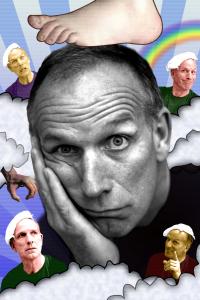
Once, long ago there was a Buxton Festival Fringe without Three's Company. But that is very long ago, far away and by now really rather difficult to imagine. One of the delights of the last however-many-years-it-is, has been to watch this very talented local trio, and friends, develop and establish themselves as a force to be reckoned with. This latest offering, Not The Messiah, demonstrates that they have lost none of their anarchic courage, ambition, surrealism and sharp wit. If anything, these characteristics have been heightened by maturity, and, in this play, control, subtlety and depth.
Three's Company has established a loyal fan base. There was a good audience and they were not disappointed. We all laughed and in the end many wept. This is a play for many voices and characters, many of them belonging to Graham Chapman, that most troubled and troublesome of the Python team, and all of them played with impressive skill by George Telfer. A one person play puts a harsh spotlight on the actor's skills, there is nowhere to hide. Fortunately Telfer didn't need a hiding place - every inch of the stage was his, he had total mastery of every word* and every gesture. He was versatile, nimble and brought his many parts together into a fantastic narrative.
But there was another tour de force here, that fantastic narrative after all was the work of the author. Tom Crawshaw seems to go from strength to strength. This is the sort of script that makes me want to see the play again, immediately, just to see how he managed to do that. Clever, clever writing; I admire him hugely. Again, even the best actor with the smartest script can appear laboured without good direction. This appeared to be so simple and inevitable, so smooth and effortless, that tribute has to be given to the invisible guiding hand and imagination of Yaz al-Shaater.
Need I go on? Three's Company is back in town. Go see them. Be proud of Buxton. For there will, I imagine, again come a time when there will be a Buxton Festival Fringe without Three's Company. Let's hope that's not any time soon. I for one want more of this stuff.
*except one - but his confident summoning of his prompt without leaving his character was for me one of the best moments of the evening.
Susan Cross
PAPER TOM - Handheld Arts

This was so very much better than I had anticipated. By the time I arrived, after a hard day's work, I was regretting my decision to come to something that sounded at best depressing, at worst harrowing. By the time I left, I was delighted and moved by this clever, witty and inventive piece of theatre and by the commitment of the cast of four. This play and these actors deserve a larger audience (and I believe would have much wider appeal than their publicity blurb suggests).
This play skillfully highlights similarities and differences between the wartime and peacetime experience of First World War and Afghanistan veterans and the societies they lived in. The action moves between parallel stories that are funny, poignant and sad and shows different perspectives on them all. Props, projections, recorded voiceovers and four wooden boxes help to transport the audience clearly and convincingly through time and space, while the cast and the well-honed script explore relationships at home and at war. The performance throughout is stylish and sophisticated; I particularly liked the beautiful and evocative bodywork, including one mavelous scene that blended the action of the frontline with a waltz. There is much to enjoy here. I am so pleased that I saw Paper Tom. I thouroughly recommend it, even (maybe especially) if you are not sure that it's your sort of thing.
Hannah Cross-Phillipson
PEACEFULLY AT HOME by Nicola Schofield - Organised Chaos

Beneath the serene country side, more than just chirping birds disturbs this English garden. Peacefully at Home is a pleasant, touching story about family, missed opportunities and how the loss of a loved one can cause the aching unsaid to be confessed.
The play opens with Una, played by the sensitive and watchable Sheila Jones, pensively smoking a cigarette out on the patio as she mouths a Hail Mary. This opening sequence alludes to the play's voyeuristic undercurrents. The characters constantly feel they are being watched, by an unknown spectator, preventing them from saying and doing what they really feel. This is reiterated in the metaphor of the dying father who haunts the characters.
Nicola Schofield's simple and true text combines the everyday with the unrepeatable as the circumstances force her challenged and distressed characters to confide in one another. In Peacefully at Home Schofield has created a beautiful depiction of an ageing family, filled with regret. The back stories and emotions are so tenderly performed by the cast of five that the audience imagine the characters pasts as though they were seeing them live.
The performances are subtle and understated, making them living, breathing examples of the modern family. Most interesting of all however is Bridget played thoughtfully by Joan McGee with pitiful pain and tiredness that hangs in the air like the smoke from Chris's (Lee Joseph) chain of cigarettes.
Directed by the clearly talented Emma Hatcher, Organised Chaos bring us a charming and affecting production. Thoroughly enjoyable and I look forward to seeing their next production All Because of Molly in the Pavilion Arts Centre, Buxton in September.
Sian Dudley
QUESTION NO. ONE - Blue Dragonfly Productions
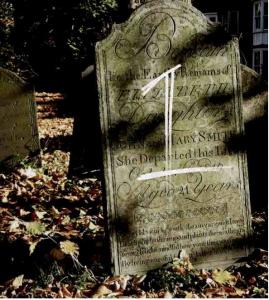
Question No. One is about the somewhat paradoxical idea of the death of The Grim Reaper. The actors switch between their secretarial characters to the more human subplot of a couple, Robin and Jess, dealing with a terminal diagnosis.
Although the back room of the United Reformed Church Hall did them no favours their commitment to creating an imaginative and thoughtful story should be commended. The staging was lovely, four desks facing inwards with the audience seated amongst them on one side. In the centre of the room were two lower tables, where much of the action took place. We entered to three characters scribbling at desks. Dressed in shirts, ties, jeans and large black rimmed glasses the ladies look at one another in a way to suggest their personalities to us, the weird one, the quite one and the rational one. The desk at the front of the room, where we assume death once sat was empty - one wonders if Mr Reaper had a lot of paper work prior to his death.
The implications of Death's death is thankfully and purposefully left unsaid, and the play has a very "here and now feel" which is later alluded to in the subplot which is mainly concerned with creating and completing a list of things to do before you die.I found all three performers natural and easy to watch good vocal and physical actresses. The women played to their strengths with a mixture of caricatures and more real life characters. The performers passed the roles amongst themselves with a simple change of a jacket or swap of a scarf, which was necessary as it became increasing harder to distinguish who between them. Perhaps Robin and Jess could have been played by the same two actors each time, as I found it difficult to connect with any real relationship or chemistry when the actors playing them kept changing. One small point, nothing to do with the performance as such but still effected my enjoyment. It may have also been a good idea to remove the clock on the wall, there's nothing that spoils a performance more than a clock to watch. It distracts you from the created space and time, reminding you of the real world outside.
I felt that perhaps the clearly talented cast could have challenged themselves a little more. The play left me largely unaffected, by time the audience arrived Death had already committed suicide and the couple had already received the bad news, what was left for us was an unfortunate diminuendo or a winding down so that the climax of the show was nothing more than a funeral and a naff throw away in which Robin receives a phone call. Turns out I'm not going to die after all!
Blue Dragonfly productions are certainly talented, an in Question No. One have created a quirky and novel show.
Sian Dudley
SMALL PORTIONS by Claire Spratt - Planet Rabbit Productions Ltd

Small Portions is "six short comedy plays on one bill performed by five actors". Not all six are the same length, nor do they have the same actors in them. The six plays are: Tea towels and Tiaras, Night watch, The Joy of Painting, Fancy pants, Stargazing, and Foot day.
The variety of the different plays is brilliant, it's all quite fast-paced, but the comedy is well-timed and the switching between the plays isn't confusing, or difficult to follow. For the first performance of a show that long, I thought it was well put together, really entertaining. The humour was delivered nicely, with an endearing set of scenarios to work it into.
The acting felt very genuine, and the script was very relatable somehow. The characters were all well developed, and all had different personalities, which
was good, as you weren't thinking of them as the person from the previous play, they were obviously being someone else; I was just engrossed in the current short play, not thinking about the one before it.
The scene changes were slightly lengthy, and maybe a bit clumsy; it felt a bit awkward watching the scene be set for the next play, but once completed the stage suited the characters, and set the atmosphere for the short plays perfectly.
I would recommend Small Portions, although perhaps not if you like edgy or dark comedy, the humour is domesticated, but all six of the short plays are funny- there were lots of laughs, despite there only being eleven people in the audience.
Bethany Pearson & Molly Gill
SOMEWHERE BETWEEN SIX AND SEVEN - Blue Dragonfly Productions
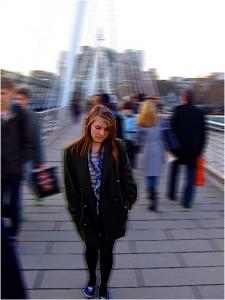
WEDNESDAY 20TH - SATURDAY 23RD JULY - 6PM
UNITED REFORMED CHURCH (VENUE 55)
"Imagine if you ran up to the roof to save someone from jumping off, and you got there, and it wasn't them, it was a stranger. What would you do?"We enter the venue to see Sofia, poised at the edge of tall building. The tension builds as the clock ticks towards 6pm and Sofia appears ready to jump ...
Set in London, we explore the lives of three young women. Sofia, who appears to have so much, yet desperately searches for the next step; fun-loving Katie who longs for closeness; tense and watchful Jo, trapped in her stress-filled job and loveless relationship.
This is an extremely well-written play, with tension and tragedy well-played, but also with comic moments - Jo's frustration at having "nothing to wear" and Sofia's frustrated attempts to buy a train ticket bringing a smile of recognition from most audience members!
Lucy Bromilow as Joanne is excellent, her stress and tension conveyed in every muscle and movement and her contact with the audience drawing us into her life. Steph Green gives a lively performance as the irrepressible Katie - and a memorable monologue as a male Scottish London-cab driver - with a real feel for comedy moments. Sarah Weston as Sofia is not only the writer of this wonderful piece but also an accomplished actress who is able to convey so well the dreams and confusion of youth.
With three award nominations at last year's Fringe, I had high expectations of this show - and I wasn't disappointed. Captivating characters and a well-written, thought-provoking script, acted with real feeling by three very talented young performers.
So what do you do if you find a stranger on a roof-top? And does Sofia choose to jump? Do go along and find out for yourself . . .Stephanie Watts
SPACE - Nose2Nose
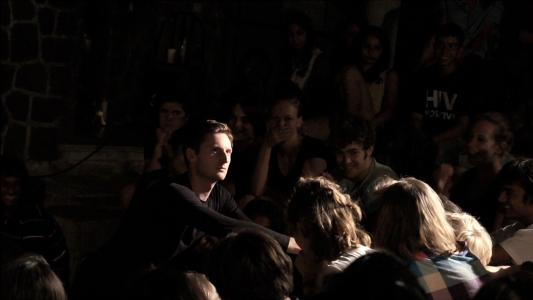
Pauper's Pit 9th July. Further performances 11th, 12th, 16th and Fringe Sunday.
Space is a one-man show, written and performed by Timothy Mann. The only prop is a seldom-used chair. No music - the show starts with a short video clip of people offering answers to the question "What is Space?" No costume changes. Simple lighting - but Tim is often working in the shadows.
In Space we meet a number of characters - ranging from an elderly science teacher, who sounded too uncomfortably like the immediate heir to the throne for my liking, to a near voiceless son of a bullying Texan military father. What is never clear is how these characters are related - or where they are related. Are they real somewhere - or are they in the imagination of one character?
This element of uncertainty is encouraged as the audience is brought into the show as they are addressed directly. Today's audience was restrained, and maybe slightly nervous, a different audience no doubt might react more confidently and that would affect the shape of Space. Though we are encouraged to accept that it is generally the shape of a duck's egg.
If Space has no obvious, immediate narrative (and since it is not linear how could it?) over the course of 50 minutes a resolution of sorts emerges.
Space is recommended. You'll laugh a bit, you'll have plenty to think about and you'll have much to admire in the compelling performance of Tim Mann as he demands that you be part of his space - wherever or whatever it is.
Oh, Tim Mann bears a passing resemblance to the young David Tennant. That will help some of you.
Keith Savage
STRANGERS / ETRANGERS by Sheryl Clowes - Chameleon Theatre

again at the Paupers Pit 9th, 16th & 18th July
Madam et Monsieur (the Man and the Woman) in this drama engaged the audience in an exploration of the need and fear of intimacy between two people. It does this through an experimental style of dialogue.
You need a bigger decanter; and forget the slide projector!
The players, set in a contemporary environment (a party in a hotel) converse using an arrogant Victorian / Maupassant language, moving from English to French to effect a pompous distance from each other. The pretence of meeting a stranger.
The drama is made difficult, for the audience, because of its method, but, actually, through this awkwardness we are brought very close to the couples fears.
Strangely and unexpectedly, because of the incomprehensible way this couple treat each other, we begin to empathise with their inability to be intimate.
There is a strong anticipation in the script which keeps us expectant and hopeful that they will eventually 'come together' and we really wish that they would break through the games and ... but we have a sense that they will fail.
The dialogue setting of 19th century language interspersed with modern 4 letter words made it difficult for me to participate in the play, a bit like reading of peanut butter sandwiches in a Keats prose; and although this incongruity was an expression of the couples frustration and struggle towards intimacy, I would have much preferred a more aligned approach.
A well worked performance.
Thank you.
I went home with more than I came out with.
Martin Wood
TELLING LIVES - Cul-de-sac theatre
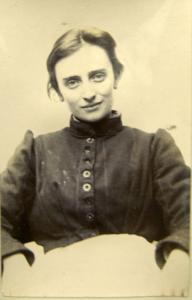
Buxton Museum and Art Gallery, 15th July 2011
Telling Lives fully lives up to its billing as a Brechtian drama. Inspired by the admission books of Prestwich County Asylum, Author Eric Northey has written a play that portrays the lives of people shut away and lost to history because of their mental illness. It is a piece written not to entertain but to rouse the audience to challenge the ill-treatment and injustices, to end the suffering that was happening at the time of World War I in the asylum (and on the battlefields) and arguably is still blighting people's lives today.
At the level of diagnosis and treatment, we might comfort ourselves that medical practice has moved on from the truly harrowing 'measurement' scene in which the new scientifically-minded asylum doctor examines Lily to find the source of her melancholia. Today, we wouldn't be looking for a physical explanation for why a young woman raped and abandoned pregnant, whose baby is subsequently taken away, is self-harming. We would also understand that shell shock results from the terrible conditions of war and not from a defect in the soldier's character and physiology. However, as the (excellent) programme notes point out 'women still have their babies taken from them - for the best of reasons; discharged soldiers still come home with terrible wounds of the mind as well as the body.'
This production is well directed and choreographed, and the acting brilliantly done in the Brechtian tradition of representing reality without creating an illusion of reality. The back room in the museum became an effective theatre space, not only through the use of simple but evocative set design but through the fluid movements of the cast, in and out of the audience space, from one scene to another.
There is only one more chance to see this production on the Fringe - 16th July at the URC at 7. See it if you can.
Barbara Wilson
THAT'S NOT THE WAY TO DO IT by Sharon Lancaster - Wooden Spoons Theatre
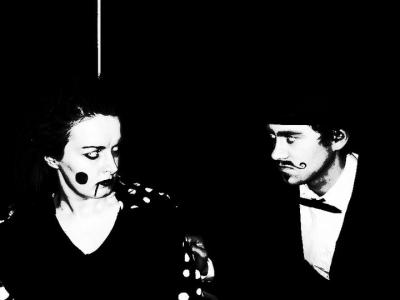
That's Not The Way To Do It tells the story of Peter & Judith, a couple in crisis, whose marriage implodes during a performance of the puppet show they have performed for years. In the show, Peter is the puppeteer, Judith the 'puppet', literally tied to Peter to physically do his bidding. Judith clearly has aspirations for something better, both in her marriage and in the act, while Peter seems to content to stay in an end-of-the-pier milieu, perhaps with a new, genuine puppet partner (and finding a sympathetic ear, it seems, in the lighting operator).
Puppets can be a bit sinister, and Judith's puppet character is unquestionably unnerving (I did think an audience of children would have been running for the exits as soon as they saw her staring eyes behind red contact lenses). Given this, I was in a way, surprised that the show ends with a slightly bitter-sweet tone rather than some kind of grotesque horror towards which it seemed to be heading.
In a way, That's Not The Way To Do It is like a puppet version of Who's Afraid Of Virginia Wolfe, a mutually antagonistic couple pouring out years of resentment and hatred in front of strangers (in this case an audience of children). In this, there is a nice juxtaposition of the naturalistic argument going on between these two characters, and the mechanics of her being a marionette. The characters are well realised and business of the puppet show detailed and slick in this clever entertainment.
Robbie Carnegie
THE CARROLL MYTH by Nathan Shreeve - Schmucks Theatre Company
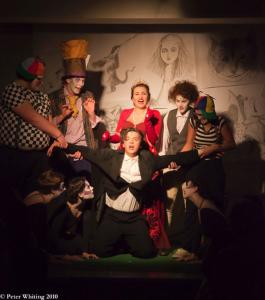
The Pauper's Pit
19th July 2011
In 1863, an unexplained rift occurred between Charles Dodgson and the Liddell family. For several years, Charles had been close friends with Henry Liddell, his wife Lorina and their children. What was the cause of the sudden estrangement? Was it that Charles had become too close to 11 year old Alice?
Nathan Shreeve's The Carroll Myth suggests that there may have been other explanations. With not one but three Cheshire cats to baffle and insinuate, who knows what is really going on? Alice may be Charles' muse, the inspiration for his stories, but she seems perplexed by his Jabberwocky and frightened by The Walrus and the Carpenter. Why can't Charles just tell more stories about her? Henry is singularly unimpressed by Charles' work, worried about the effect on his daughter of all this gibberish, and adamant that Charles should on no account publish under his own name. Charles is increasingly troubled, struggling to maintain his role as respectable mathematics lecturer while responding to, and ever more in thrall to, his imaginative creations. The boundary between reality and fantasy becomes more and more blurred. Lorina Liddell readily morphs into the Red Queen: losing his head may not be the only threat from her.
Though there are dark moments, on the whole this production by Schmucks Theatre Company is great fun. Members of the cast move in and out of their 'real life' and Alice in Wonderland roles with ease. Their individual encounters with Charles are funny; the chaotic ensemble numbers are hilarious. We may fleetingly feel sorry for Charles, tormented as he is by his fantasies. But mostly we are delighted and intrigued by his creations. When he asks Alice 'Will you, won't you, join in the dance?', we hope the answer is yes.
Barbara Wilson
THE HAUNTING by Liam Scott - The Lantern Theatre Company
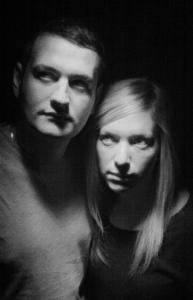
On a rainy, stormy night in Buxton, a group of fellow travellers took refuge in the Pavilion Arts Centre. They had gathered to witness a Haunting, and a Haunting was what they got.
Lantern Theatre Company's The Haunting takes us to a holiday cottage in rural Wales where a young couple, Mark and Stacey go for a weekend away with their baby. Stacey is sensible and organised, Mark the class clown, whose idea of domesticity is to put the beer in the fridge, and his idea of humour is phallic gestures involving cucumbers and beer bottles. No sooner have they arrived than things start to go awry - objects start falling of the walls, and weird noises begin to be heard ...
The Haunting gets off to a slightly slow start (a long sequence of creepy music, followed by a sequence of answer-phone messages), but such is the anticipation of an audience expecting something scary to happen that this can be written off as tension-building. Likewise, to some extent a little of Mark's antics can go a long way, but again, his behaviour establishes the character, and the irritation which Stacey often feels towards his fecklessness. More importantly, the humdrum domesticity of their bickering effectively undercuts the paranormal business that follows.
Once the ghostly goings-on begin, they are generally well realised. The physical effects are realised with varying degrees of success (maybe first night glitches in a new venue), but are more than made up for by the genuinely creepy sound effects which created at least one jump-out-of-your seat moment. The two actors work well together, and Anna Hudson is particularly to be commended as Stacey, since it is largely up to her to 'sell' the fear to the audience, something she does with a natural skill.
As its title might suggest, The Haunting is an old-fashioned ghost story, but its modern setting gives it a fresh slant. It makes no attempt to explain the cause of the otherworldly manifestations, but in so doing keeps the action moving briskly, once it gets going in an entertaining and effective thriller.
Robbie Carnegie
THE IMPORTANCE OF BEING FRANK by Tom Crawshaw and Oscar Wilde - Three's Company
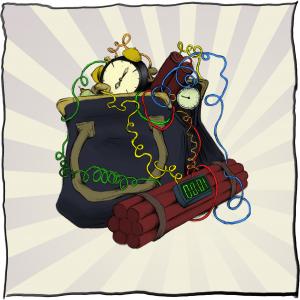
In 2008, Three's Company's entry for the Fringe was Auditorium. It told the story of the inhabitants of a bookshop who find that the storeroom is a portal to a small theatre in Buxton, leading to a series of mishaps and audience participation. It was, in my view, one of their more successful shows - I saw it three times, from a preview in Buxton to a performance in Edinburgh, and watched it grow and mature over that time.
For one of their 2011 entries, the company have returned to similar ground, but set themselves much greater challenges which, at present are not entirely met. The show begins with the first quarter of an hour of The Importance of Being Earnest, with Yaz Al Shaater as Algernon and Tom Crawshaw as Jack Worthing (only annotated briefly by an unusually vociferous theatre usher). Within a short time, however, the theatre's fourth wall has been well and truly broken as Algernon steps out of 1894 and appears in 2011, interrelating with the audience in the Pavilion Arts Centre Studio and a silver-spandex-clad time traveller (Jessica Holloway).
Now, as I say, this is ground that was covered to some extent in Auditorium, but here the actors have a much harder challenge. Auditorium was a modern-day show, Frank is Victorian, and not just Victorian, but a Victorian era that speaks in the timeless epithets of Oscar Wilde. To maintain the integrity of the world created (this is not just a production of The Importance of Being Earnest, this is the real world of The Importance of Being Earnest), the actors have to remain convincingly Wildean in their dialogue in the modern age, much of it improvised. This is accomplished to greater and lesser degrees of success, but I would suggest the use of 'anyway', 'all right' and - most particularly - 'okay' should be avoided. Likewise (in what must have been a scripted line) the use of an expletive by Jack, while getting a laugh, undermines everything that they've worked hard to create. Hats off to Ashlea Kaye as Gwendolyn who most consistently keeps in Wildean character throughout.
The audience on the first night certainly enjoyed this lively show (which ends in a slightly shambolic but original way that I won't spoil by putting it in print), but I do feel that improvements can be made and - knowing Three's Company - will be made. There's the nucleus of a very good show, but it's not quite there yet.
Oh, and if you're planning an evening of Fringe around the listed timing of Frank running for an hour, beware - the first night ran a good half hour over time.
Robbie Carnegie
THE MAHARAJAH AND THE KOHINOOR by Hardial Singh Rai - ZeroSeefr and the Drum Arts Centre

Arts Centre - Studio, 13th July 2011
The Maharajah and the Koh-I-Noor is the dramatised story of Duleep Singh, the last Emperor of the Sikhs. He came to the throne at the age of only 6, under the regency of the maharani his mother, and at the same time came into possession of the legendary Koh-I-Noor diamond. After the British annexed the Punjab (as presented here, with the aid of a traitor to the throne) in 1849, the maharani was exiled and Duleep Singh was sent to Britain. There as an impressionable teenager, he was befriended by Queen Victoria and welcomed as a playmate of her children. Whether the queen had any true affection for him is debatable - he seems to have been regarded somewhat as an exotic pet. In any event, the maharajah 'went native', threw off his Sikh religion and clothing, adopted the lifestyle and manners of an English aristocrat, and eventually presented the Koh-I-Noor to the queen as a token of his esteem. As an adult, he came to rail against the inadequacy of the pension awarded him by the government, and more broadly to realise all that he and his country had lost. He died in Paris at the age of 55, while plotting (as shown here) with émigrés of various nationalities to regain the Punjab from the British.
This play was commissioned by the Anglo-Sikh Heritage Trail in 2008, and is intended primarily as an educative piece to show the whole of Duleep Singh's life and, it seems, to highlight the wrongs that were done to him and his country. The actors Taresh Solanki and Emma Sian Cooper perform a series of rapid-fire changes of costume and accent to represent the characters that people the maharajah's story. The caricatures of, for example, Queen Victoria and the young Prince of Wales, would I am sure entertain an audience of school children. An adult audience, however, would I think prefer more in-depth character development, and a less didactic approach. Duleep Singh's story is certainly one with great dramatic potential. Perhaps the author, Hardial Singh Rai, could revisit it with older theatre-goers in mind.
Barbara Wilson
THE MOLE AND THE WORM: AN UNDERGROUND TALE - Teatro Entre Escombros
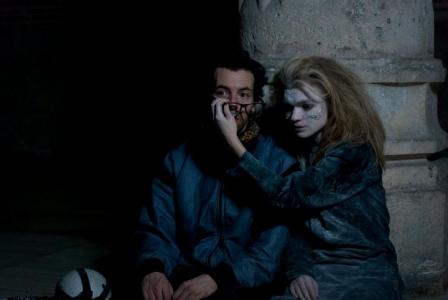
As I ventured below into dingy Pauper's Pit the sound of a drip.drip.drip echoed and I got the feeling that this underground tale was going to be very dark and dank. I was met by Amy Gwilliam, lying splayed on the floor, dead or asleep, covered in white dust - the mole. Once the announcements were made and the lights dipped and entered the worm. Kitted head to toe in caving gear the worm, played by Javier Ariza suddenly abseiled from the fire exit onto the stage. What an opening, so beautiful and captivating. I had high hopes, if the rest of the show was anything like the first 3 minutes I was in for a great night of fringe theatre.
The scene which followed is one of the strangest sights I have ever seen. The lonesome Spanish pot-holer begins to examine the rocks, with patience, wonder and childish excitement. He slowly licks and tastes his way around the cave (note to self, don't touch the walls on the way out). Finally he comes across a strange new crevice, the spread legs of our Victorian woman, slowly he enters, much to her delight, eventually he ends up waist deep in what must be the vaginal Mines of Moria! As is so often the case in these situations a mutual climax is reached and the couple part leaving our Spaniard revolted and our Victorian madly in love.
The play continues much on a similar vein with the Victorian, who having been trapped underground for 170 years, attempts to be one with her new Romeo. The play then turns even darker as she remembers that Shakespeare's Romeo was exiled and removes the Spaniard's climbing rope - his only means of escape. Generally I found the play to be altogether unsettling a very strange combination of sex and stone. I often felt trapped myself as it become quite claustrophobic at times, particularly when the pot-holer tried to escape by banging on all sides of the Paupers Pit.
The clearly talented cast performed with intensity and Gwilliam's performance was particularly captivating with her wide-eyed and longing looks, far off into the darkness. However it could not detract from the weirdness that popped up throughout, I am referring particularly to the Madonna dance that was shoved crudely half way through, in which the pot-holer attempts to teach the Victorian how to be a modern woman through the mode of dance.
Lowri Jenkins text was well written but confusing and although the themes of loneliness and modern relationships were clear, if there were any other overarching metaphors they failed to reach me. I do however feel that some of the more difficult to watch moments were down to the direction. For example watching a man perform a series of sick-burbs, made me and I'm sure many others want to vomit also. Should it have carried on any longer Underground Venues would have had a massive clean-up on their hands. Likewise for the scene in which the Spaniard self destructively consumes all his food and water, he then presumably changes his mind and spits the masticated contents back into his water bottle. The icing on this somewhat strange tasting cake was the Spaniard urinating at the back of the stage. For a 45 minute show, he could have held it in. Overall if the intentions were to shock, freak out or disturb - the play was a great success.
If you want to see something strange, The Mole and the Worm: An Underground Tale is your best bet. If you have a strong stomach.
Sian Dudley
THE SEXES by Polis Loizou - The Off-Off-Off-Broadway Company
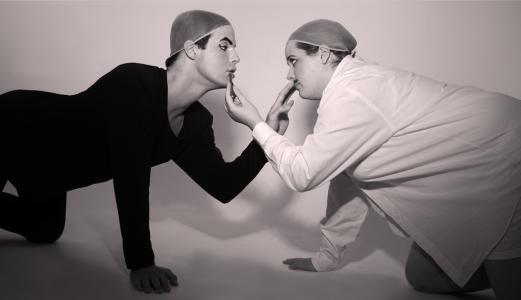
Underground Venues, 14th July 2011
The Sexes opens with a video montage projecting a world of glamour and fame, but the set is more prosaically a backstage dressing room reflecting the slightly past their prime careers of the protagonists. Lars and Jacquee are coming from playing lovers onstage and returning to their offstage marriage, but the friendly chatter turns darker when Lars boasts about the gender-unspecified part-of-a-lifetime he hopes to land. As they argue over who would be best suited to the part, all the marital jealousy, resentment and rivalry comes to a head.
In an added twist to this battle of the sexes, Lars is played by a woman and Jacquee by a man - at one point Jacquee remarks "Do you not think they'd recognise a man in drag?" Well perhaps not, if he's as gorgeous as you! As the conflict deepens, they dissect each other's characters, impersonating and mocking each other with surgical precision using all the insight gleaned over the years of marriage. Jaacq Hugo's cool and languid Jacquee contrasts well with the bluff and more demonstrative Lars (Laura Louise Baker), and they do well to retain sympathy for what are two rather self-absorbed characters.
The writing by Polis Loizou is very sharp, but at times the arguments seem overly-intellectualized - marital strife is rarely like that! And without giving too much away I'm unconvinced by the exchange about children. It seems to be another opportunity for game-playing than getting to the black heart of their problems. Also, the relationship may retain more tension if it appeared more even, Lars may mock Jacquee, but she is able to penetrate right to his core with her crushing barbs.
The Sexes is an imaginative and insightful look at a marriage within which two individuals strain to achieve their own potential, while both reliant on and in competition with the other. The envy and spite are never far from the surface but the ties that bind are perhaps even stronger.
Steve Walker
THE TELEGRAM & CINEMA LIMBO - A DOUBLE BILL - Chinley Amateur Dramatic Society

The two plays were performed back to back with a refreshments intermission at The Methodist Church. Although it is outside the official Fringe period, they have another performance on Monday 25th July.
Unfortunately the acoustics in the church made it difficult to hear some of the dialogue between the players, particularly in the first short play. I would advise moving the performance to one of the other rooms in building or if this is not possible, that the players should play to the audience more.
That aside:
Cinema LimboThis short drama is a conversation between Vicky and Joshua in the box office of a cinema on Christmas Eve during the screening of 'Casablanca'. The conversation is interrupted regularly by Vicky's boyfriend, Stuart, recently promoted. The conversation is typical of two young people discussing a variety of subjects from rivalry at school to the possibility of time travel. Vicky flirts with new boy Joshua despite the background presence of her boyfriend.
The characters were well played and their personalities were easily observed through the actors' body language, facial expressions and movement on the stage, making good use of the two chairs. Although it was sometimes difficult to observe, because of the acoustics, the good timing of the delivery of the two main players together with natural silences added to make the characters real.
The use of the large screen over the stage area, which played 'Casablanca' (the sound of the film was raised and lowered as the door to the box office was opened and closed) was a distraction for those at the rear of the audience.
The TelegramThis was a more serious piece set in the living rooms of Viv and Fred during WW2 and simultaneously in the 1980s.
This was an interesting drama which was preceded with a slide show of pairs of photographs of sailors both during the war and today. It had some sympathetic performances, particularly Viv (old and young) and Vera, their neighbour. It was engaging, humorous, touching and enigmatic and the costumes and script quickly took the audience into the 1940's.
Viv and Fred where married at the end of WW1 and as Viv, points out, there was just enough time between the wars to raise more boys to fight.
The main theme of the play was the difference between the attitudes of men and women during the war to the fighting. Viv tells us that the causes of war are men and politicians and while men expressed pride in their bravery of their sons and the war's just cause, a woman's lot was to stay at home and worry, confused as to why the country is involved in another country's fight.
The device of telling the story from two periods in the lives of Viv and Fred was effective and the switching between them very smooth.
Martin Wood
THE TEMPEST - OPEN AIR PERFORMANCES - Theatre By Numbers
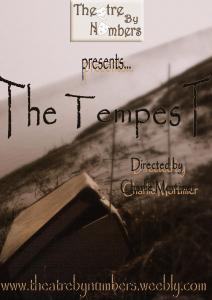
The opening scene of Shakespeare's final play reveals a storm at sea; if the omens looked bleak for an outdoor production in mid-July, then the elements were somewhat against this band of troopers for this evening's performance. The announcement of a cast member unable to perform this evening was unfortunate; (an injury sustained by one of the actors meant the producer had to stand in - literally - for the role of Caliban (providing a dumb show in mask, whilst the 'real' Caliban read from a seat 'off stage'. However, as they decided to stage this play in the vast open space of the Cricket pitch rather than go for something perhaps a little more theatrical or intimate, there were moments when the visible presence of the injured actor proved distracting to the central action. As the play got underway, the rain threatened on more than one occasion and the cast bravely soldiered on; there was never any doubt that the five actors came prepared for their parts and knew the play well enough to wrestle with the demands of the language and the space (with a confident and resolute performance from Ben Patterson as Prospero); in some pieces of theatre, economic doubling up of parts can work to its advantage, but it could also become confusing and result in a lack of clarity - for example the same actor playing Ferdinand, Sebastian and Stephano was perhaps one character too many). However, the actors relied on a different, often regional, accent as a clear reference to the ability to be creative with their voices; they gave us Cockney, Cornish, RP, Northern Irish and aristocratic, often in the same scene. It was clear that the piece was founded on some original visual ideas (the use of masks, cloaks, magic staff, costumes, vocal effects) and good use of physicality (the opening scene on the ship with creative use of just a suitcase was impressive). In all, this was a spirited performance that struggled against injury and the elements, but was ultimately compounded the decision to use economy over needs. Still, if you like your Shakespeare outdoors and creative then give this a chance and you may be surprised.
Jason Hudson
THREE HISSES FOR VILLAINY! by Brian J Burton - MADS Touring Players
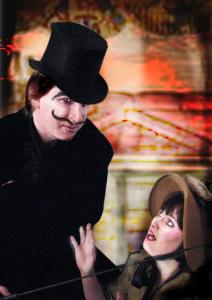
St. Mary's Church, 15th July 2011
Macclesfield Amateur Dramatic Society (MADS) have once again made the perilous trek over the Cat and Fiddle for the Fringe. This time they have brought the boos and hisses of the Victorian Music Hall to St Mary's Church with two short melodramas, Jolly Roger and Willie Won't 'ee???
In Willie Won't 'ee??? Fanny is doing the domestic chores while feckless husband Willie (can you see where this is going?) is out drinking. While her mother storms off to sort out the errant Willie, the virtuous Fanny is visited by the cad, Sir Richard Binterton ("Call me Dick" - you did see where this was going...), with a cunning plan to have his wicked way. Thwarted by Fanny's innocence and loyalty, Sir Richard returns in disguise in increasingly madcap attempts to hoodwink and bully her, before finally getting his comeuppance.
Matthew Coath splendidly over-acts with relish as the baddie, with a great evil laugh and cartoon asides to the audience. His barnstorming entrances and exits in various guises had the five year old accompanying me in kinks of laughter. Gemma Wilson is an excellent foil with her sweet down to earth nature and appeals to the audience for advice.
The melodrama was great, but the prologue seemed bizarrely unrelated to the rest of the show. A tuxedo-ed impresario introduced a series of acts - violinist, poet, singers - with admirable alliterative allusions. So far so good, but each of the acts was in modern dress and, bar the violinist, performing modern material. I couldn't see how it related to the Victorian theme, and I'm sure I'm not the only one who wondered if he was at the right show. Some costumes and material closer to music hall could have provided a much better build up to the main event.
However, the melodrama was very entertaining and the majority of the audience were staying for the next performance to see Jolly Roger, with more joining them to enjoy the show.
Steve Walker
TIRESIAS/PLAYER KING - Performance Exchange

This double bill is in fact three for the price of two ending as it does with the gentle digestif of a mime by Catherine Davies and Luke Addison.
For the entrée Daniel Foley introduces us to the blind seer Tiresias via a Jamesian encounter with his spirit as it wanders the ruined theatres of Ancient Greece. And it is the heavy, broadsheet, portentous Tiresias of Greek Tragedy that we hear from rather than the lighter, tabloid Mr T of Ovid's Metamorphoses. I personally would have enjoyed tales of his gender swap and his adjudication between Zeus and Hera but we get his encounters with Heracles, Pentheus (not Ovid's version), Oedipus, Creon and Dionysus which are, well, tragic. Daniel as Tiresias tells these stories well in monologue but the colour is monotone and perhaps some of the other stories might have introduced some chiaroscuro?
The aperitif is Daniel again in monologue as Hamlet's player king alone on the road having been abandoned by his troupe because, as the note pinned to his chest informs him, he is old and can no longer remember the lines. This he bears witness to as he relates his experiences in Elsinore finishing most reprises with - "...something, something". Daniel gives us very well the resonant tones of the travelling actor manager. I feel this short piece could well be developed into a longer exploration of the fate of one of the minor characters from Hamlet. After all, it's been done before.
John Wilson
One more performance on the 15th at 7:30 in the URC
WHAT WOULD SHARRON DAVIES DO? - closer theatre company

Janis Barlow is a middle-aged hairdresser, who, over a lifetime of disappointments and bad relationships has found escape by empathising with the former Olympic swimmer Sharron Davies. Now in a loveless marriage, and with 2012 approaching, she has decided to get herself it and found a new outlet for her fantasies in synchronised swimming!
This monologue is touchingly delivered by actor-writer Lesley Emery. It carries shades of Alan Bennett's Talking Heads, with its eccentric central character and its quirky Northern charm. There are many genuinely humorous moments, and Lesley manages to incorporate topical jokes (including the recent Beckham birth) into the show.
You've got to take your hat off to this actress. In this one-woman show, she proved herself a real trouper. Moved to the front room of the Milton's Head by a poetry slam in the back bar (with the amplified performances from that coming through the wall, plus all the general pub noise), taking the tickets, switching on her own music, she sets herself quite a task to keep immersed in her character, but she does an admirable job. She incorporates all the other business she needs to do into her performance, making what could jar seem natural, and making the audience feel as though they are just listening to a conversation from this bubbly, funny, but sad dreamer - a very likeable character with whom you want to spend 45 minutes.
Robbie Carnegie
WITZELSUCHT & MORIA - GC Morgan

In his brand-spanking new show, Witzelsucht & Moria, creator and performer GC Morgan twists an audacious tale about the career of a fanatical psychiatrist into a neat performance wrapped up in a string of meticulous dialogue and horrifying experiences.
Morgan recounts the life and tribulations of a mad psychiatrist with a good dose of black comedy and flair. As each chapter unfolds we discover the inner workings of Morgan's character. Just like his patients, his own experiences are put under the microscope as we take a ride with him through journeys that chronicle his childhood, hopeless love affairs, obvious father issues and what led him to exert his own brand of madness.
Morgan relies on language and delivery to perform his story rather than theatrics. Fortunately, Morgan has a wonderful way with words. He captures a moment in time and manages to recreate the finest details with rich imagery and poetic language - a big feat for a one-man show.
This was a passionate performance filled with graphic and compelling story telling. Look out for this one at the Edinburgh Fringe Festival.
Simone Ruggiero